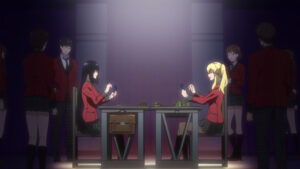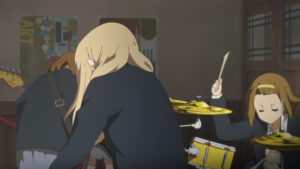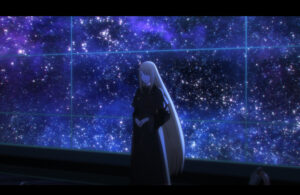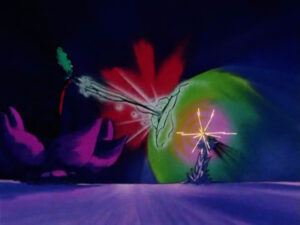Anime is animation. Anime is storytelling and characters and drama and sometimes explosions and sometime heartache or laughter or rage or joy. But anime is also defined by music. Lots and lots of music. From unforgettable opening themes, to random battle music that gets your blood pumping, to moving insert songs that are more important to a scene than the pixels on screen, music plays such a large role in anime that it can’t be ignored.
Now, I’m not really much of a music person. I don’t know and frankly don’t care about the top song in any genre. I don’t subscribe to any music streaming services. If I hear a new song and find it catchy I’ll probably look it up and buy it… but it’s pretty rare for me to hear anything new.
The exception is with anime. Each new season of shows brings new chances to find new songs to enjoy. That, and there’s a huge backlog of great anime with great songs just waiting to be heard. Over time I’ve slowly built up a decent collection of anime songs that I enjoy. While I’ve purchased some full soundtracks, usually I’ve only bought one or two songs per show. I like opening and ending themes, and I like songs that are defining points of shows.
So… I’ve looked through my little library of anime music and pulled out some of my favorites that I felt were particularly good or interesting or impactful. Some of them tell complete stories, some are just rocking’ intros. Some have complex fast-paced lyrics, some don’t have any words at all. What I want to do over the next several weeks is preview songs you may not have heard or listened to recently and talk about the anime they come from and why I like the song and the show it comes from. I’ll bring up any trivia I know off hand and I’ll link off to good English covers that I’ve found for each song.
I’ll update this series whenever I feel like it. Maybe stick around for new music. Maybe stick around for a new anime recommendations. There will be spoilers here. I can’t describe the instruments much less the musical theories that make up these songs. But I can describe why these songs were great and provide some context to how they fit into their shows.
Deal with the Devil – Kakegurui
 Kakegurui is set at a fictional high school for the children of the ultra wealthy elite who control business and government. The school has normal classes, but what sets it apart from normal institutions of learning is the way every after school activity involves massively high stakes gambling. From poker to roulette to far stranger and more dangerous games of chance, Hyakkaou Private Academy’s real goal is to ready these up and coming future titans of politics and industry for the tense, high stakes situations they’ll face in the real world.
Kakegurui is set at a fictional high school for the children of the ultra wealthy elite who control business and government. The school has normal classes, but what sets it apart from normal institutions of learning is the way every after school activity involves massively high stakes gambling. From poker to roulette to far stranger and more dangerous games of chance, Hyakkaou Private Academy’s real goal is to ready these up and coming future titans of politics and industry for the tense, high stakes situations they’ll face in the real world.
Coming in to this frankly bizarre setting is transfer student Yumeko Jabami. If this were any other show, Yumeko would beat back the all powerful student council who controls every aspect of school life. She’d be an unimpeachable white knight outplaying everyone in this den of vipers. Instead, though she is friendly and has good morals, Yumeko is, in some ways, the most ruthless and gambling crazed of all the academy’s students!
Yumeko doesn’t so much as bat an eye when her fellow students look down on her or others. She doesn’t care if the student council has made having gambling debt at this school akin to being a slave to your fellow students. She doesn’t give a second thought to people trying to literally take control of others’ entire lives. All she wants is the most exciting, tension-filled gambles possible. The higher the stakes the better. The few times we ever see Yumeko angry is when someone tries to intentionally lose. She doesn’t care if you cheat as long as the base rules of the game are fair as she’ll always find a way to outplay you. But rig a game so that she is sure to win? So that she doesn’t get the thrill of being on the knife’s edge of victory and defeat? That’s her biggest turn-off and she might never speak to you again!
“Deal With The Devil” the opening song for Kakegurui’s first season, is a blast. This fast paced, upbeat, jazzy number is filled to the brim with edgy, double entendre lyrics all relating to gambling. Raising the stakes. Seeing through an opponent’s strategy. Having an unbeatable hand. Etc. It’s gotta be Yumeko singing here, and she is in full control of the situation! The song is the perfect opening for a show that is, itself, wild and edgy. “Deal With The Devil” rarely if ever comes into play during the show. It seems satisfied to open each episode along side its deviously suggestive bits of animation then wait for its chance to impress all over again next episode. Speaking of that animation, it is filled with spoilers for both the first and second season. The best kind. The kind that only make sense once you watch the show. Until then, the frantic pacing of the music will more than keep you occupied.
For a long time, I thought “Deal With The Devil” was a song whose speed and lyrics stuffed with double meanings would be all but impossible to fit into English. There doesn’t seem to be enough time to convey everything as the music zooms to the next line and next verse in the blink of an eye. Boy was I wrong! Kayli ‘Kiyo’ Mills did an outstanding job of creating a completely original cover for the song that lives up to its fast paced power. My one complaint, which seems a bit embarrassing when I say it out loud, is that she fails to meow at the appropriate time! But you know what? For a show as slyly suggestive as Kakegurui… that kind of thinking is absolutely perfect!
Fuwa Fuwa Time – K-On!
 Fuwa Fuwa Time is a song whose strong introduction and many repeat performances made it THE song of an incredible anime.
Fuwa Fuwa Time is a song whose strong introduction and many repeat performances made it THE song of an incredible anime.
K-On!, the anime featuring this song, is perhaps the ultimate combination of Comedy, Slice of Life and Iyashikei (calming shows with very little drama). It stars five high school girls who join together to continue their school’s light music club… but really all they do is goof off, drink tea, eat cake, go on shopping trips, and maybe every once in a while they actually even play some music.
Somehow, what should be a show that gets dropped because nothing is happening slowly builds and builds until you’ve fallen in love with the smallest character quirks and most mundane happenings. This is a show where, by the end of the first season, a simple look down a familiar empty staircase can evoke feelings nearly as strong as the most dramatic anime around. And not because something dramatic happened. Just because that staircase is the one these characters you’ve come to love use to get to their music room where most of their antics take place.
“Fuwa Fuwa Time” is a song that comes in several different flavors. The original version of the song saw the K-On! girls switch who sang vocals because of silly happenings that left one of them with a blown out scratchy voice. Later versions switched back to the original vocalist for other silly reasons. While still later versions added another club member with a new instrument. The version I’ve chosen is actually one of the last played since it appears over the end credits of the K-On! Movie that released after the tv series. All the versions start off with an instantly recognizable guitar riff that flows into keyboard and drums that support upbeat sing song lyrics. The song is about finding the courage to express yourself to someone you secretly admire. But, really, it could be about anything. The sound of it is just so instantly catchy.
I featured the movie version of “Fuwa Fuwa Time” partially because I like the more airy, stereo separated feel of its opening, and partially because I like the way it switches lead singers back and forth between verses.
One of the reasons I think of Fuwa Fuwa Time as THE song of K-On! Is, oddly enough, because we almost never hear all of it. Instead, the show frequently features the song’s intro or outro as a way to signify the start or end of a concert or a performance without having to play and animate the entire thing. I bet the entire song is played beginning to end less than five times throughout the show’s run. But we hear pieces of it so often that I can’t hear even the first few guitar cords without immediately picturing the anime. It’s that ingrained in my mind.
Speaking of the animation, though, this song is one of the first in a line of K-On! songs to feature totally unexpected music videos. Who would expect a song about a secret admirer struggling to express hidden love would be represented by… a peace-loving outlaw hippy band performing concerts and running from both the police and the military in their 1950’s Cadillac?!
K-On! has many fantastic songs. Some are more closely related to its characters or what passes for the anime’s goofy, minimal plot. There’s one or two that probably generate stronger feelings of friendship or love, like a song about one character’s beloved sister or the group’s most treasured friend. But if you want me instantly thinking of K-On… just play me the first second or two of “Fuwa Fuwa Time” and you’ll have me nostalgic for one of anime’s most landmark shows.
Finally, as I often do, I look for a great english cover of the anime songs I love. This version by GS 1.0 hits it out of the park with full cosplay and just a great energy about the whole thing!
Ensemble for Polaris – Vivy: Fluorite Eye’s Song
 Vivy -Fluorite Eye’s Song- follows the character Diva, a newly created artificial intelligence in a robot body. Like all AI’s in this anime, Diva was given a singular main task to perform. AIs in this world come in a huge ranges of shapes and sizes built for specific purposes. Some are music teachers. Some are vacuum cleaning drones. Diva was created as a songstress and told to make people happy with her singing and then told that to accomplish her goal she’d have to sing from her heart.
Vivy -Fluorite Eye’s Song- follows the character Diva, a newly created artificial intelligence in a robot body. Like all AI’s in this anime, Diva was given a singular main task to perform. AIs in this world come in a huge ranges of shapes and sizes built for specific purposes. Some are music teachers. Some are vacuum cleaning drones. Diva was created as a songstress and told to make people happy with her singing and then told that to accomplish her goal she’d have to sing from her heart.
The show soon sets Diva on an exciting one hundred year mission involving time travel and a world ending AI uprising that she is tasked with stopping. Diva gains a talkative know-it-all AI partner, and hand to hand combat skills, and far more knowledge about life and death than she ever wanted, but throughout it all, she continues to struggle with the question of how to make people happy with her singing, and how an AI like her can possibly truly sing from her heart.
“Ensemble for Polaris” is one of the few songs Diva does not sing. Instead it is first sung by Estella, a caretaker AI hostess who tends to the needs of her guests aboard Sunrise, an orbital resort space hotel she runs. This slow, almost haunting tale about space and the mythical beings that inhabit it searching for and finding each other is first sung to calm and wow a room full of Estella’s human guests. The song comes back later during a moment of high tension where it’s themes of two lost souls finding one another becomes even more relevant.
“Ensemble for Polaris” doesn’t quite represent Vivy in the same way that “Moonlight Densetsu” can be said to represent Sailor Moon. If you want that, Vivy’s “Sing My Pleasure” is kinda it’s overarching theme song. But this song was one of the first big examples of music being used in the show to change people’s lives for the better. The way it was used at the end of the 4th episode brought real tears to my eyes and had me rush to tell my friends that I’d found a new great anime.
Anime where music plays an outsized, in-universe roll is… kinda my thing. 🙂
Moonlight Densetsu – Sailor Moon
 The first song I can remember as being from an anime has to be the english version of Sailor Moon’s “Moonlight Densetsu”. Sailor Moon, itself, was, back then, this strange cartoon with super powered girls fighting scary monsters while trying to live out their normal lives. There were awesome elemental attacks, and cool transformations, and ultimate finishing moves. And this song kicked all that off each episode.
The first song I can remember as being from an anime has to be the english version of Sailor Moon’s “Moonlight Densetsu”. Sailor Moon, itself, was, back then, this strange cartoon with super powered girls fighting scary monsters while trying to live out their normal lives. There were awesome elemental attacks, and cool transformations, and ultimate finishing moves. And this song kicked all that off each episode.
But, more than that, the Sailor Moon theme song was the battle music that played in the final confrontation of the evil queen vs Sailor Moon representing the last guardian standing between earth and ultimate evil. Watching tiny Usagi hold her ground against the overwhelming attacks of Queen Beryl is kinda my first and maybe best memory of good fighting back against evil. Queen Beryl shouts about how the world is already filled with filth and hate, but Usagi responds that she believes in the world and in her friends. It’s a theme played out so many times in so many different anime, but for me, its starts here with those first guitar riffs of Moonlight Densetsu!
The song itself is interesting because even though it is the key bit of music used in the first season’s final battle of good against evil… it’s not all that upbeat and its lyrics have very little to do with such an epic struggle. Instead, it’s the soft focus, dreamy, angsty musings of a teenage girl happy to be born on the same planet as the boy she is in love with. But for something so unsuited to dark lightning being repelled by a shrinking bubble of light… it actually fits plenty well. The themes in that final battle, of hope and love overcoming evil, are kinda exemplified by these innocent musings of a girl in love.
In the years and decades since, I’ve found that the version I fell in love with is the english remake of the original Japanese song. And while I respect the original a ton, there’s something about that english version set to the cuts of the english Sailor Moon opening that still excites me to this day. Usagi does this little slashing move with the silver crystal beating back Queen Beryl’s dark lightning attack and in that one instant the song and animation comes together for me in a moment of iconic perfection.
That said, I more often listen to the original and to AmaLee’s fantastic english cover. Both instantly send me back to that fight of good vs evil in some of my earliest days of watching anime!